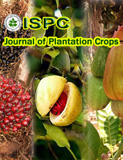Analysis of Farmer Producer Organisations in the Coconut Sector: Current Scenario, Limitations, and Policy Outlook
DOI:
https://doi.org/10.25081/jpc.2024.v52.i1.9170Abstract
Farmer producer organisation is a crucial institutional innovation that aids small holders in overcoming the issues of diseconomies of scale. Nonetheless, prior experience in the coconut sector reveals that the success rates of such organisations are not as high as projected. This article begins by exploring the relevance of FPOs in the current agrarian context and gives a brief account of the evolution of such organisations in the coconut sector. The study also highlights the points for intervention and provides a critical analysis of the significance and justification for FPOs in the sector. It also includes the challenges and actionable strategies in a ready reckoner mode. The primary motivation for the formation of producer organisations in the coconut sector is to organise unorganized coconut farmers through collectives in order to promote their socioeconomic growth. The success of an FPO is heavily dependent on having a solid business plan, and scope for scalability. Inadequate working capital, including grants and credit, is a major limitation for the majority of FPOs. In this setting, it is critical to obtain bank loans at low interest rates. The development of a well recognised and valued brand is critical for the FPO's viability. Lack of professional leadership has a negative impact on FPOs in the coconut sector, and many have gone out of business as a result. To assist them, target based capacity-building programme to inculcate leadership attributes among FPO representatives should be conducted on a regular basis. Only a few FPOs in the coconut industry have looked into the prospect of gaining premium pricing through certification techniques and product traceability. This is due to a lack of both capacity and awareness. This problem must be addressed with ultimate priority. The FPOs must be trained to be self-sufficient and weaned off external assistance in a short period of time after the initiation. Therefore, FPOs should focus on increasing productivity per unit of land and shifting their current production focus to market-oriented output.
Downloads
References
Bikkina, N., Turaga, R.M. and Bhamoriya, V. 2018.Farmer producer organizations as farmer collectives: A case study from India. Development Policy Review 36 (6): 669-687.
CDB. 2023. Coconut Development Board. ll India final estimates of Area and Production of C o c o n u t . h t t p s : / / c o c o n u t b o a r d . g o v. i n /Statistics.aspx (Accessed on 12.12.2023)
CDB. 2024. Coconut Development Board.
Progress of Coconut Producers' Society, Federation and Company formation as on 22.04.2024. https://coconutboard.gov.in/ ProducerSocieties.aspx (Accessed on 24.04.2024)
Markelova, H., Meinzen-Dick, R., Hellin, J. and Dohrn, S. 2009. Collective action for smallholder market access. Food Policy 34: 1–7.
Nikam, V., Singh, P., Ashok, A.and Shiv Kumar. 2019. Farmer producer organizations: Innovative institutions for upliftment of small farmers. Indian Journal of Agricultural Sciences 89 (9) 1383-1392.
Singh, S. and Singh, T. 2013. Producer companies in India: A study of organization and performance, CMA, IIM Ahmedabad, 126p.
Thamban, C., Jayasekhar, S., Chandran, K.P. and Rajesh, M.K. 2020. Sustainability of Farmer Producer Organisations - The case of producer organisations involved in the production and marketing of ‘neera’ in the coconut sector in Kerala, India. Journal of Plantation Crops 48(2):150-159.
Published
How to Cite
Issue
Section
Copyright (c) 2024 Journal of Plantation Crops

This work is licensed under a Creative Commons Attribution 4.0 International License.







 .
.